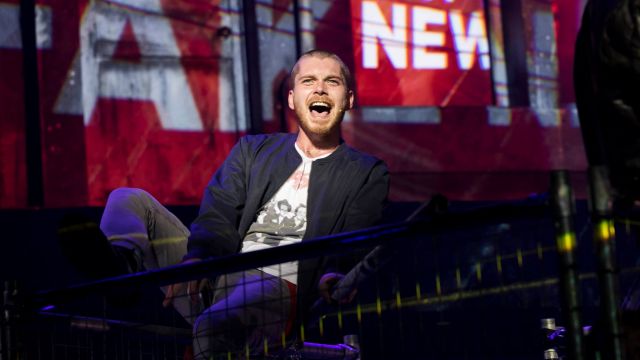American Idiot
American Idiot is a wild high-energy ride, full of passion, power, and heart. This is the show Rent wants to be when it grows up.
Let’s clear up one thing first: this is not a jukebox musical. It is a properly conceived opera told in the genre of pop-punk rock. The songs come from Green Day’s concept album of the same name (plus some from their related follow up, 21st Century Breakdown). The album is a pungent and damning response to American values post 9/11. Despite the bleak subject, it’s an upbeat and tuneful score. The songs were written featuring characters and a narrative, the intent always being they would one day be performed in a staged setting. In that regard, it’s a revelation hearing these now-classic songs being performed in the context for which they were originally written.
Although there is no “through-singing” of dialogue or “recitative”, the work has much in common with classic operas: characters pop-up unannounced, unexplained, and with no backstory, and it’s only through their brief interaction with the leads that we get the idea of who they are and what’s going on. The only dialogue is short passages from the lead character, who only recites short letters home to his parents, or diary entries. These are used mainly to set dates of the events, but the rest of the show is pretty much one song after another.
 Three friends - Johnny, Will, and Tunny - live a disillusioned and disaffected life in Jingletown, a generic suburb somewhere in the USA. Their despair is informed by the events of 9/11, the actions of the Bush administration (here updated to Trump, sadly with too much similarity), and a mind-numbing barrage of bland and consumerist media. The boys navigate through the malaise and eventually find ways to cope with the despair.
Three friends - Johnny, Will, and Tunny - live a disillusioned and disaffected life in Jingletown, a generic suburb somewhere in the USA. Their despair is informed by the events of 9/11, the actions of the Bush administration (here updated to Trump, sadly with too much similarity), and a mind-numbing barrage of bland and consumerist media. The boys navigate through the malaise and eventually find ways to cope with the despair.
Johnny (Linden Furnell), proclaiming himself “Jesus of Suburbia”, leaves Jingletown for big city life, where he meets Whatsername (Phoebe Panaretos), and St. Jimmy (Phil Jamieson, Grinspoon‘s front man, proving he has serious acting chops). Tunny (Connor Crawford) joins the Army, inspired by a funny enlistment video from iOTA as a manic Uncle Sam. Tunny is injured in battle to return with PTSD and suicidal dreams. These dreams come in the form of a seductive Angel-of-Death known as Extraordinary Girl (Kaylah Attard, who does an extraordinary job soaring and spinning over the stage on barely seen wires). Will (Alex Jeans) stays home to be with his newly pregnant girlfriend Heather (Ashleigh Taylor).
From the brilliant cast, Craig Ilott’s direction, Glenn Morehouse’s musical direction, Lucas Newland’s choreography to Matthew Marshall‘s lighting, Craig Wilkinson‘s videos, Josh McIntosh‘s set, and Melanie Knight‘s costumes, everything about this production shines and amazes. It sure has more life, meaning, and melody than many new shows out there.
 And it was a joy to hear a cast actually SING. In these days where “chest voice belt” is the law, and screaming/yelling passes for high emotion, this cast proves that real singing can carry real emotional power - and this is in a show full of punk songs.
And it was a joy to hear a cast actually SING. In these days where “chest voice belt” is the law, and screaming/yelling passes for high emotion, this cast proves that real singing can carry real emotional power - and this is in a show full of punk songs.
On the album the character of St. Jimmy is clearly Jonny’s bad-boy alter ego, existing only in Johnny’s mind. St Jimmy is Johnny’s destructive nature - leading him to drugs and recklessness, and threatening to sabotage Johnny’s relationship with Whatsername, who is bringing Johnny to maturity. What was clever in this production is that St. Jimmy is kept largely ambiguous: he’s blocked and acted in a way that we never know until the last minute if St Jimmy is a figment of Johnny’s mind, or if he is a real-life drug dealer jealously infatuated with Johnny.
Video is heavily featured in this show but this is a text book example of how video can enhance the show, rather than upstage it. And the band just rocks - giving us the raw energy the score needs yet never overpowering the cast.
 The only thing that didn’t work for me was including the ensemble in “Wake Me When September Ends”.
The only thing that didn’t work for me was including the ensemble in “Wake Me When September Ends”.
The trio of leads deliver this song powerfully and beautifully by themselves, with a simple but effective “homecoming” video as backdrop. The additional cast felt like an unnecessary distraction in an otherwise perfect scene.
Those not familiar with the show may want to check out the lyrics first. There’s nothing wrong with the cast’s diction and enunciation, it’s just that some of the songs require rapid-fire delivery, and it’s possible the clever words could be missed.
Part rock concert, part protest rally, part theatre, the show left me on a high and wondering why more modern “rock” musicals can’t be like this.
Peter Novakovich
Photographer: Ken Leanfore
Subscribe to our E-Newsletter, buy our latest print edition or find a Performing Arts book at Book Nook.

